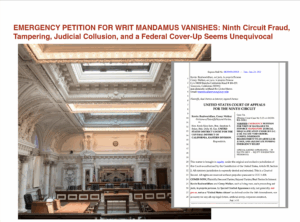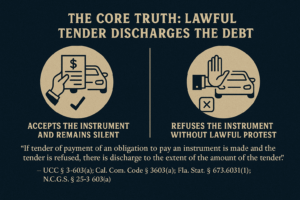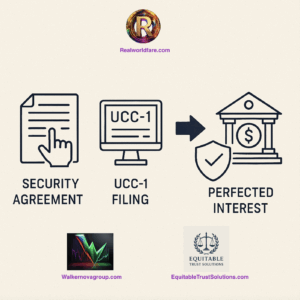When brokers act, equity responds — even without a signed contract. This article explains how real property rights can vest through conduct, silence, and lawful tender. Learn how equitable title arises when an offer is accepted by behavior, not just by words. Discover how to protect your position through affidavits, UCC filings, and quiet title actions. In equity, what ought to be done is treated as done — and truth leaves a paper trail.
In a world where real estate is controlled by brokers, escrow companies, and corporate contracts, many private parties believe that if their name isn’t on the deed, they have no rights. But that isn’t true in equity.
Equity recognizes truth in conduct, not just ink on paper. When a buyer tenders full value for a home, and the seller’s agent acts in acknowledgment of that tender — even without signing a formal contract — the buyer may acquire a vested equitable interest in the property. And when that interest is ignored or suppressed, equity steps in to enforce justice.
🏠 Real Example: Making an Offer and Being Ignored
Let’s say you send a $45 million lawful offer for a property, complete with all necessary tender of value — a negotiable instrument under UCC § 3-104, backed by affidavits, a demand for escrow closure, and delivery receipts.
The licensed real estate broker receives your offer, responds by email, says they’ll schedule a Zoom meeting, and then — days later — removes the property from the market without explanation.
✅ Offer acknowledged.
✅ Conduct consistent with acceptance.
✅ Property delisted.
✅ Tender not returned.
✅ Silence.
✅ Later — the broker admits: “I am ignoring you.”
This is not a misunderstanding — it’s constructive acceptance followed by commercial dishonor. And in equity, that means something powerful.
🔑 What Is Equitable Title in This Context?
Equitable title arises when one party:
-
Tenders lawful value for property,
-
Performs in good faith,
-
Relies on the other party’s acknowledgment or conduct, and
-
Is then denied formal recognition, despite the facts.
The broker doesn’t need to say “I accept” for acceptance to occur. Under UCC § 2-204 and basic contract law, conduct showing agreement — like removing the home from public sale — forms a contract.
Even if the deed is not signed, and even if escrow hasn’t closed, the buyer may now hold equitable title — the real interest behind the paperwork.
🧱 How to Secure Your Equitable Interest
To protect your interest in equity, you must do the following:
1. Tender Lawful Value
Submit an offer supported by verifiable consideration — such as a negotiable instrument under UCC § 3-104 and § 3-303.
2. Deliver Notice
Send a Notice of Tender, a Demand for Escrow Closure, or a Request for Conveyance.
3. Affidavit the Record
Affidavits of Completed Sale, Dishonor, and Lis Pendens create a commercial record and shift the burden to the other party.
4. Perfect Your Interest
File a UCC-1 Financing Statement and a Notice of Lis Pendens in the county records. This publicly establishes your claim — both in equity and commerce.
🧾 What the Courts See
When a court sees:
-
Tender made,
-
Acknowledgment by the broker,
-
The property removed from the market,
-
Affidavits unrebutted, and
-
Silence used as strategy…
…the judge has equitable jurisdiction to:
-
Quiet Title in the buyer’s name,
-
Order Specific Performance (convey the deed),
-
Impose a Constructive Trust to prevent further fraud or concealment,
-
And Expunge false or unacknowledged claims from the title record.
👁️ What Makes This Powerful?
You are not suing for money.
You are not waiting for permission.
You performed.
You tendered.
They dishonored.
Now, you invoke equity.
As one maxim says:
“Equity regards that as done which ought to have been done.”
✅ Final Thought
If the broker accepts your offer by conduct, keeps your instrument, removes the home from the market, and then says “we never had a deal” — they’ve already created the deal by their actions.
Their silence isn’t strength. It’s dishonor.
Equity knows.
Equity sees.
And equity — when invoked properly — enforces.




